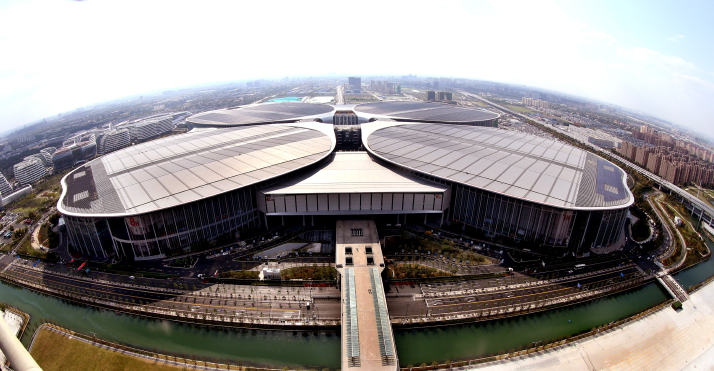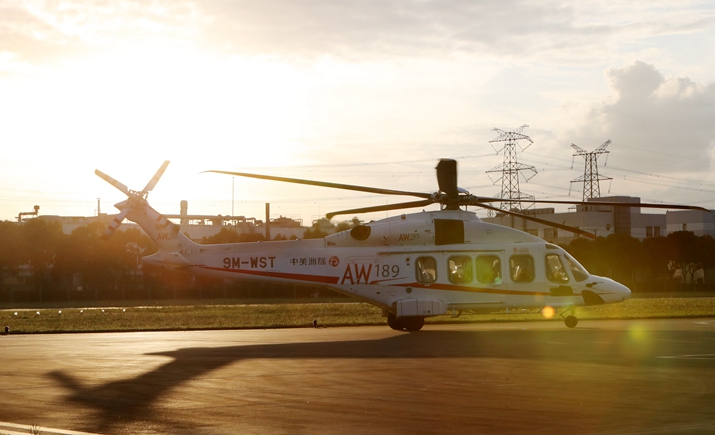| Focus |
| Playing Fair | |
| Import expo is to promote globalization against the headwinds of protectionism and unilateralism | |
|
|
 A bird's-eye view of the National Exhibition and Convention Center (Shanghai), the main venue of the first China International Import Expo (XINHUA)
Owners who regard their pets as family members are worried about the apparently shorter lifespan of their animals in China.
"In Japan, the average lifespan of cats is 18 years, but Chinese cats hardly reach 12," Brandy Niu, General Manager of Mars Pet Nutrition China, an American pet food and nutrition company, told Beijing Review. Regarding the six-year difference, Niu said that food is of the utmost importance. In Europe and the United States, owners buy dedicated food and almost 80 to 90 percent of it can be converted to calories, she explained. However, in China, the conversion rate is about 10 percent. In other words, only 10 percent is food, the other parts are excess leftovers. "So both the industry and consumers require education," Niu said. Her company is working with government agencies and industry associations to map out a standard for pet food. China's first safety code for pet food was rolled out in May and will benefit the whole industry. As part of its efforts to promote healthy pet food, Niu's company will showcase its brand, introduce new products, and understand the preferences and interests of consumers at the first China International Import Expo (CIIE), to be held in Shanghai on November 5-10. "The CIIE is one of our top priorities in the second half of 2018," Niu said. A bridge and platform In 1989, Mars Pet Nutrition China became one of the first companies in the industry to come to China. It will mark its 30th anniversary next year and the CIIE has a significant role in its development plans. "It is not just an expo, the CIIE is both a platform and bridge," Niu emphasized. "It will connect Mars Pet Nutrition China with government officials, manufacturers, service providers and consumers, creating more possibilities for cooperation and innovation in the future. The expo will end but the opportunities it provides will continue." The first import-themed expo in the world, the CIIE has become a talking point at home and even abroad since President Xi Jinping declared the plan at the Belt and Road Forum for International Cooperation in May 2017. At the opening of the Boao Forum for Asia annual conference in April, Xi said that the CIIE is "not just another expo in an ordinary sense, but a major policy initiative and commitment taken of our own accord to open up the Chinese market." Receiving the fortified signal that China will continue to open up, a kaleidoscope of enterprises from all over the globe are ready to take part in the event. So far, more than 2,800 exhibitors from over 130 countries and regions have confirmed their attendance, and 80 countries have signed up to participate in the country pavilion for trade and investment. This area covers about 30,000 square meters at the expo where companies can showcase their trade and investment achievements and signature products. More than 150,000 Chinese and foreign buyers are expected to join. "The CIIE is not a solo for China but a chorus comprising all countries," Zhong Shan, Minister of Commerce, said at a press conference in March. The government will launch a new round of high-level opening up and prove its belief in shared prosperity, Zhong said. "For the CIIE, we were given the green light by all parties," Niu said, adding that foreign enterprises can feel the increasing openness and convenience for cross-border transactions.  An Italy-made AW189 helicopter, an exhibit for the first China International Import Expo, arrives in Shanghai on October 20 (XINHUA)
New demand With more and more foreign enterprises from different industries entering China, Mars Pet Nutrition China is not the lone company trying to bring about changes. Transformations can be anticipated in all kinds of industries while China is opening the door wider to the outside world. Evans Vanodine, a vintage British brand specializing in household cleaning products, is aware of the potential of the Chinese market and has signed up for the CIIE. To its delight, even before the event kicks off, it has begun talking business with prospective buyers. "Some purchasers came to know us through the CIIE and began contacting us," Yang Kenan, Vice President of Liaoning Kolinaijia Trade Co. Ltd., the Chinese agency of Evans Vanodine, told Beijing Review. "We are seeking high-quality cooperation with Chinese regional agents and large enterprises during the expo." As the world's second largest economy, China, with its 1.4-billion population, holds great potential for imports and consumption growth. According to the Ministry of Commerce, in the next five years, China is estimated to import more than $10 trillion in goods and services, providing huge opportunities for foreign enterprises entering the Chinese market. While enjoying profits from the Chinese market, foreign enterprises that contribute to the development of the Chinese economy also help grow the market by encouraging consumption upgrade, speeding up the transformation of the industrial structure, and boosting the optimization of the trade environment. Evans Vanodine will debut one of its signature products, a cleaning and disinfecting liquid meant for hospitals and schools, in the Chinese market at the first CIIE. "This is a rarity in China," Yang said. "We are bringing over 200 kinds of products so that consumers can enjoy a better life and improve their health consciousness. That will facilitate the upgrading of consumption." Historic opportunities The CIIE's appeal stems from the transformation of China's foreign economic relations and trade policies. Initially encouraging exports, China has pushed to increase imports, putting equal emphasis on both. As Xi said at the Boao Forum annual conference, "China does not seek trade surplus; we have a genuine desire to increase imports and achieve greater balance of international payments under the current account." This year, China has lowered import tariffs for drugs, automobiles and some other products. From November 1, tariffs on over 1,500 items were cut, lowering China's average tariff rate to 7.5 percent from 9.8 percent last year. "Foreign enterprises like us have been enjoying preferential policies at all levels of government, to create a fair and transparent producing and trading environment," Niu said. Niu also regards the first CIIE as a way to improve China's trade environment. She has some suggestions, such as streamlining the inspection and quarantine procedures for certain commodities like meat, cooperating with more countries for access to more products, and preferential treatment for companies that have earned credits in previous customs clearance processes. With more suggestions coming in from the attendees of the CIIE, China will offer a more convenient business climate to increase imports in the face of rising protectionism and unilateralism. The target is to strengthen economic and trading ties and share the huge market and dividends of economic development with the international community. It is an echo of the first CIIE's theme—New Era, Shared Future. Copyedited by Sudeshna Sarkar Comments to zhangshsh@bjreview.com |
|
||||||||||||||||||||||||||||||
|